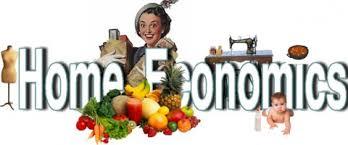Home economics as a field of study usually to a common man bring to the mind about sewing aprons, cooking, and baking cake. But however, home economics as a field of study has illuminated the mind so much in the 20th century to know that home economics covers a wide range of studies, including food and nutrition, clothing and textiles, child development, sociology, and consumer protection.
When home economics was first introduced in the late 1800s, the study was somehow in addition to other functions to help students prepare for life on the farm and helping their families.
In the 20th Century, the study acted as a bridge for students to enter into institutions of higher learning and later into professions. Students who graduated from these advanced programs went on to teaching positions to pass on this knowledge and some are led into positions in hospitals, restaurants, hotels, and even government. Along these lines, as universities and other tertiary institutions conducted research, home economics study has taught advanced classes in nutrition and hygiene as well as economics.
WHAT HOME ECONOMICS IS AS A COURSE
Home economics is cooking and other aspects of household management. Home economics or domestic science, or home science is a field of study that deals with the relationship between individuals, families, communities, and the environment in which they live. Home economics courses are offered internationally and across multiple educational levels. Home economics courses have been important throughout history because it gave women the opportunity to pursue higher education and vocational training in a world where only men were able to learn in such environments. In modern times, home economics teaches people of all genders important life skills, such as cooking, sewing, and finances. With the stigma the term “home economics” has earned over the years, the course is now often referred to by different terms, such as “family and consumer science.
WHY DO WE STUDY HOME ECONOMICS?
We study home economics to promote a well- being of individuals. The study helps the society to develop human progress individually and it comprises major ideas on food, clothing, home, and family. Human progress is necessary for society to grow and it is so important since well-being is the machinery that vibrant all aspects of human experience.
BRANCHES OF HOME ECONOMICS:
Here, we've outlined just some of the careers that involve knowledge of home economics. For some of them, you'll need a qualification in a subject other than home economics to go further, although home economics will still give you a useful background for the career.
1. Food Scientist/Technologist
2. Food Technician
3. Dietitian
4. Nutritionist
5. Catering/Restaurant Manager
6. Hotel Manager
7. Domestic Services Manager
8. Chef
9. Consumer protection (Trading Standards Officer)
10. Environmental Health Practitioner
11. Textiles and clothing
12. Tailor
13. Fashion Designer
14. Education (Teaching and lecturing)
15. Home Care Organiser
Food Scientist/Technologist
Food Scientists are experts on the biological, chemical, and physical make-up of food, and how food can be processed, stored and preserved. Food Technologists apply this knowledge to make new food products and ensure that they are safe and of good quality.
Although Food Scientists are more likely to go into research and Food Technologists into production, the division between them is not clear-cut. Both may work in research and development, production, and quality assurance management.
Food Technician
Food Technicians help Scientists/Technologists to develop food products. Technicians test the safety and quality of and finished products, as well as testing packaging, processing, and storage techniques.raw materials
They look after the day-to-day running of the laboratory, and might also help in the research and development of new products.
Dietitian
Dietitians give people information and advice about the right diet to maintain their health or to help them cope with or overcome an illness.
Dietitians may be based in hospitals or the community. Hospital work mainly involves diet therapy for individual patients, for example, people with food allergies or. They also train and advise other health professionals in diabetes in the hospital.
In the community, a dietitian might be involved in clinical work or health promotion, or a mixture of both. For example, they might work with health professionals such as practice nurses and health visitors. Health GPs promotion could include giving talks in schools or groups such as slimming clubs and pregnant women.
Dietitians work in lots of other areas, including sports nutrition, food, and industries, education, pharmaceutical research, and journalism.
Nutritionist
Nutritionists help us to understand how affects our health. They work in lots of areas, including the NHS, nutrition sports nutrition, the food industry, and animal nutrition.
NHS Nutritionists often work in the community, helping people to prevent problems such as cancer, stroke, and diabetes. They might run healthy eating sessions, teach cooking skills, and produce information about a healthy diet.
In the food industry, Nutritionists research and develop new food products. They advise on food products' nutritional content, such as how much fat and salt they have in them.
The right diet can help sports professionals to train and perform at their best. Nutritionists work with Athletes and Players, and also give people advice in the fitness industry.
Animal Nutritionists look at ways to improve the quality and quantity of things such as eggs, meat, and milk. They also try to improve their pets' diets.
Catering/Restaurant Manager
Catering/Restaurant Managers work in a wide variety of places, from top hotels to fast-food chains, hospitals, cruise ships, and prisons.
Their main responsibility is for staff management, recruitment, training, and day-to-day organization. Other areas include quality control, hygiene, and health and safety.
Managers might be responsible for setting and controlling. They might also plan menus, order supplies; budgets greet customers, and deal with any complaints. They need to be good at dealing with people and should be able to work under pressure.
Hotel Manager
The duties of Hotel Managers vary according to the size of the hotel.
In a large hotel, the General Manager organizes a team of departmental Managers, taking overall responsibility for planning, and marketing. In a smaller hotel or guest house, the work will be more 'hands-on', with greater budgeting day-to-day contact with guests.
Domestic Services Manager
Domestic Services Managers, often known as 'Housekeepers' in the hotel industry and 'Domestic Bursars' in educational institutions, are responsible for the cleanliness and general maintenance of large residential establishments. They work in places like hospitals, hotels, schools, universities, and colleges.
They are responsible for organizing the work of domestic staff, who keep the buildings clean and in good condition. They might have other areas of responsibility, such as organizing laundry services or arranging repairs.
They spend part of their time checking the work of staff, but there is also an office-based element to their work, involving administration and managing. Budgets
Chef
The term 'Chef' tends to be used in hotels and restaurants, whereas 'Cook' is used in work canteens, schools, and hospitals.
In the large hotel and restaurant kitchens, there are a number of specialist Chefs running different sections (such as vegetables or pastry) under the direction of the Head Chef. In smaller establishments, the Chef might do everything - ordering food, cooking, and clearing up.
There can be opportunities for creative cookery, and to experiment with new and specialist dishes, particularly for experienced Chefs.
In catering services, such as for airlines, schools, and hospitals, the work is more routine. It often involves preparing large numbers of meals in a central kitchen, which are then distributed to different sites and re-heated.
Whatever the setting, the work of a Chef or Cook is physically demanding. Most of the working day is spent standing up in a hot kitchen. Unsocial hours are often part of the job.
Consumer protection (Trading Standards Officer)
Trading Standards Officers (TSOs) enforce the laws and regulations that cover the goods and services we buy, hire, and sell.
They inspect premises, sample, test, and measure products, investigate complaints, give consumer advice, and enforce the law. Employ TSOs. Local authorities
TSOs make regular checks to see if things like scales and petrol pumps measure accurately. They check toys and electrical products to make sure that they are safe to use.
TSOs might take samples of food and drink products to make sure that nutritional information on labels is accurate and that advertisements are not misleading.
Environmental Health Practitioner
Environmental Health Practitioners (EHPs) protect us from environmental hazards at home, at work, and in public places.
EHPs make sure our food is safe to eat, and improve conditions for people living in unfit or old housing. EHPs also monitor and control air, water, land, and noise pollution.
EHPs visit places such as offices, houses, leisure services, shops, and restaurants. They advise people on the best ways to protect themselves and others from environmental hazards. EHPs must also enforce the law, for example, closing food premises or requiring Landlords to carry out essential repairs.
Some EHPs work for private companies, making sure that they are following the law and safeguarding their employees and customers.
Textiles and clothing (Textile Designer)
Textile Designers create designs for fabrics, carpets, wall-coverings, and soft furnishings. Some, particularly in small companies, spend most of their time reworking traditional designs. In large firms, there may be more opportunities to create original designs.
It's important for Textile Designers to have knowledge of yarns, dyes, and manufacturing processes, as these affect designs.
Fashion Designer
Fashion Designers design clothing and/or accessories. A few work in, designing exclusive for haute couture garments individual and producing seasonal collections. clients
Others design ready-made quality garments, often following the trends set by haute couture. Fashion Designers working for wholesale manufacturers design the clothes that we see in shops and in catalogs.
Tailor
Tailors produce hand-crafted garments - particularly men's suits - to order. They also make alterations to garments.
They advise customers on the range of fabrics and styles available and take measurements. They then make cardboard or paper patterns, cut out cloth and stitch the garments, mainly by hand.
Textile industry
There are also many technical jobs in the textile industry, such as:
Textile Technologist Textile Technician Textile Operative Dyeing Technician
Education (Teaching and lecturing)
Most Home Economics Teachers work in secondary schools. They teach pupils about child development, food, and nutrition, or textiles. Design and Technology Teachers can also cover areas related to home economics, such as food technology and textile technology.
Teaching methods include group and practical work, discussions, and using audio-visual materials and the internet. Teaching may also involve visits to places of educational interest. Home Economics Teachers also have to plan lessons, mark work, write reports, go to meetings, and give feedback.
Home Care Organiser
Home Care Organisers manage the services that help people to cope with their own homes. They recruit, train, and supervise Home Care Assistants who provide practical, social, and emotional care too. Home Care Organisers clients assess clients' needs and arrange services such as the delivery of free meals.
Other jobs in the caring services
Some people with training in home economics go into housing work or health education/promotion.
Conclusion
As a student, after knowing and understanding home economics as a field of study and its benefits to individuals and the society at large, researchwap.com as an online resource center has come up with a vast database for students to have access to numerous free project topics and uncountable research materials on home economics and it related courses.
Below are few home economics project topics that you might want to take a look at
EDITORS SOURCE: Home Economics As A Field Of Study And Its Benefits













No Comments